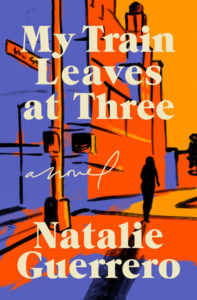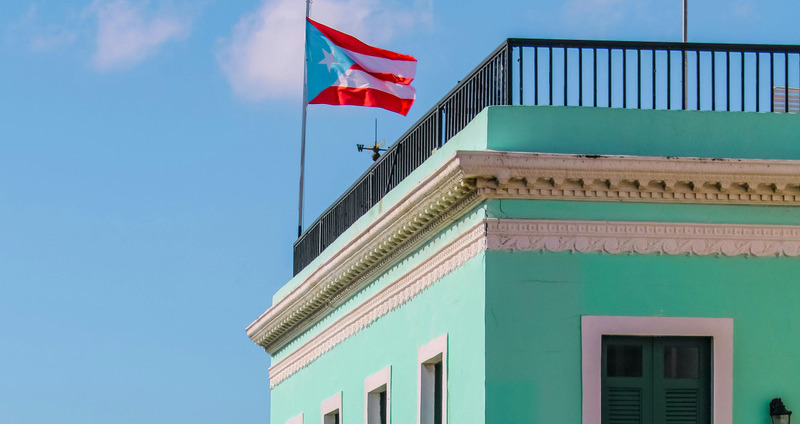“Ya no me quiero hablar en inglés porque mi cultura estás—perate. Deep breath. Cómo se dice ‘at stake’ en español?” I ask my brother.
Article continues after advertisement
This is what my language sounds like lately. This is what is happening in my head. I’m trying to rinse myself of my English, get back to the way I was born to speak—in Spanish, on an island, reading the Puerto Rican greats in my native tongue. Sipping on a coffee still, of course, but with less inhibition, less American greed, more respect for communal living.
My brother laughs. “En juego,” he says. “At stake.”
“Ay si,” I say. “En juego.” I don’t want to speak English anymore because my culture is at stake.
A few months ago, Trump signed an executive order declaring English the official language of the United States. Three weeks ago, ICE invaded Los Angeles, the city where I live, and plenty other cities across the country. This week, he’s attempting to delete birthright citizenship from the fabric of our nation. “America is back!” he shouts any chance he gets.
What came next? After a lifetime of running from myself? Isolation, sure, but also a deep sense of confusion.
I’d spent years feeling my Spanish slipping away, ashamed of my accent, avoiding the moments where my tongue betrayed me. And now, here it is, confirmed by policy—our language, our voices, our culture officially deemed foreign. English, official.
There’s something particularly chilling about it all, claiming English as our official language in the same breath he asks us to go “back to our roots.” Roots that, if you look far enough are planted firmly within the native, black, and brown communities of this nation.
I haven’t made it back to Puerto Rico permanently just yet, though I dream of an older me, baking under the sun with my seven Spanish-speaking grandchildren running down the mountain. For now, I settle for California. Take a crack at the west coast. Here, supposedly under the same sun that shines down in Santiago, I find a foreign land, one without sofrito or rice and beans. Here, I contemplate how to get back to myself—my/self who was made not by Americana but by Marcela y Ramon at La Bombonera en Viejo San Juan, by Carmen and Francisco in a little blue house en Santiago. That self.
“Bueno.” My brother nods his head slowly, Spanish rolling easily off the tongue, a small token the islands gave him for playing baseball with them in the summer. His words are like water. Agua. My first Spanish word. For a long time, my only Spanish word. In Miami, during the hot summers when I’d visit my aunts, they’d playfully tease me, holding up a cup of the clear liquid and pointing. “Agua,” I’d insist before they handed it to me, my language a lifeline. The only way back to each other.
As the years passed though, the water became more murky, dangerous even. It was no longer a safe house but a manifestation of my limitations, my lack of language. At nights, when my aunts and uncles would scream and laugh over table playing dominoes, I’d sneak into whatever bedroom held the oversized jackets thrown on its mattress and my shame crept in, as I whispered in Spanish, mimicking their words quietly, so no one could here. There, a line in the sand that had been drawn. On one side of it was me, an imposter in a Dominican body, and on the other it was them, my family of native speakers who came by our culture honestly.
“Casi intiendo todo,” I’d insist for a while, but still I struggled to find the courage to contribute, and on the off chance that I did, in the time it took me to translate their Spanish to my English and spit something back out of my mouth in Spanish again, the conversation had already moved on.
So in a fit of angst, of rebellion, really, instead of hunkering down and learning the language, I ran from it. I was Dominican once, I thought, Puerto Rican. And so began my journey to shapeshifting Americana. As a result, for years I avoided Washington Heights, my home, my aunts at parties so that no one would see me for what I really was—a fraud. A fake Dominican. A fake Puerto Rican. A Gringa.
I’d meet new friends, like the Argentinian girl who lived in the dorm next to mine freshman year. When she called out hola, mamita from the shower stall, I’d answer with a stiff hey, too nervous to let her hear my accent—the way my Ls and Rs sometimes blur, the way my O’s can land too hard at times. So there we’d be in the bathroom, me stamping her passport at Ellis Island while my cheeks burned hot, her immigrating all over again as she struggled in English to ask if I had an extra makeup wipe at 1 AM.
But no matter how far I ran, I could never get rid of myself completely. I would crave pastelitos when I came home at Christmas. In my headphones, I’d listen to Franky Ruiz, Marc Anthony, and Aventura. I’d pretend to be on the phone, speak in my native tongue while the snow poured down on me at Boston University. There, with no one on the other end, I was free to trip up on my words, make mistakes without fear, and try it on, what it’d be like to be Puerto Rican again. At night, I’d dance with my white friends, teaching them to salsa when it was sexy because my two left feet would never be worse than theirs. It was sweet when I’d let my Latinidad out to breathe, painful when I’d try to tuck it back in.
But still, I convinced myself that I was doing the right thing. I was not abandoning my culture. I was owning the evolution of my personhood, honoring the sacrifice my dad made when he moved here by assimilating and moving with the pack. But what came next? After a lifetime of running from myself? Isolation, sure, but also a deep sense of confusion. A lethal outward gaze. A search for home in places that were never meant to hold me.
When I moved to Los Angeles in the latter half of my twenties, I reached my breaking point and began asking myself what I lost, not gained by being American. It was a time in my life when I was getting tired of running. I had done it, shed the skin of a former self, and moved across the country. Alone, in a 400 sq. foot studio apartment I looked in the mirror and I couldn’t find any remnants of me left, only lucid dreams in broken Spanish and my dad’s voice on the phone saying something like cuidaté tu credito, Natalie. Make sure you take care of your credit. A Latin dad’s way of saying I love you.
I began making myself picadillo on Sundays to remind myself that I was not, in fact, without flavor. At Mexican restaurants, I’d order in Spanish, no matter how the waiter insisted on answering me in English, twisting their face to say but you’re black how can you speak Spanish? I jammed out to Lin Manuel’s In The Heights, screaming his lyrics on the 405—When I was younger, I’d imagine what would happen If my parents had stayed in Puerto Rico Who would I be if I had never seen Manhattan? If I lived in Puerto Rico with my people?
Most notably, though, I booked a trip back to San Juan. My God, San Juan. When I arrived, instead of my stomach performing its usual backflips, it stood steady, and it surprised me, how I felt on my island. On the way to the hotel, I stopped at España, a little deli where my mother and I used to go when we visited the island on vacation. When the cashier greeted me in Spanish and my words came flying out. I ordered nearly everything on the menu. There, on the island, I lost my shame, mostly because there was no room for it. The place where my embarrassment typically sat in my body was replaced with a quiet humming feeling, a relief, a full-body homecoming. At home, in Puerto Rico, no waiter twisted their face at me when I asked for tripleta or a jugo de Naranja.
I find our line in the sand, between those who flow like water and those who are still learning to swim the depths of our language to be dangerous.
They barely even looked at me, actually, and that was affirming—a moment where I fit. By the end of the trip I was saying things like “la cuentita” instead of “la cuenta” and having 30-minute discussions with my Uber drivers. Mi español no es perfecto, I’d say when I got in, pero es mío. My Spanish isn’t perfect, but it’s mine.
For me, Trump’s executive order this week is not just a political move. It is a reminder of the language I have a right to reclaim. An invitation to fight forward against erasure, to integrate my culture and my country together, wholly. I find our line in the sand, between those who flow like water and those who are still learning to swim the depths of our language to be dangerous. Today, with the knowledge of how long it took me to find a map back to myself, I get angry, and resentful even for what America has made me trade for its acceptance. Stories from my grandmother, from my aunts, and my cousins in DR, lost to a language barrier.
For centuries the colonizer has used language or lack thereof to isolate us, to keep us hidden from each other. Trump’s tactics are the oldest tricks in the book. On boats, they’d separate us, take away our common ground to keep our fingers pointing at each other in hopes it would distract us from pointing it at them. Today, America has a president who laughs when they call my home a garbage island. I’m not done with that, though the news cycle might be. A man who throws paper towels at starving people, begging for electricity. But what do we have? We have Bad Bunny. We have Zoe Saldana. Angie Cruz. Romeo and my abuelita still stirring her pot in New York to keep the con-con. We have sun in the middle of January.
So what I’m saying here, I think, is that all these years I’ve been asking the wrong question, and what I wake up with today is another one burning inside me—what is possible for me now that I am Puerto Rican? Dominican? From the island, completamente. What mysteries will I uncover now that I am done out blowing out my hair, hiding the way my skin gets 10 shades darker in the sun?
I guess we’ll never know, not really, anyway, all the things we’ve lost to the English language, to the idea of America. But I have to believe we’ve still got time to figure it out. In the meantime, translate this—in my next life, I want to come back water, wash up on the shores of San Juan, and be recycled over and over with the clouds of my island.
__________________________________

My Train Leaves at Three by Natalie Guerrero is available from One World, an imprint of Random House, a division of Penguin Random House, LLC.
